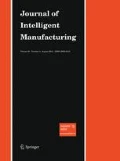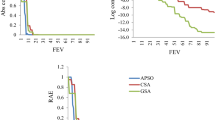Abstract
This paper introduces a general methodology to perform a comparative evaluation of different approaches to the problem of scheduling with uncertainty. Different proactive (off-line) and reactive (on-line) scheduling policies are evaluated by simulating the execution of a number of baseline schedules under uncertain environmental conditions, and observing the solution behaviors as such schedules get stressed by exogenous events. The analysis aims at assessing the impact of both proactive and reactive scheduling efforts on the robustness of the baseline solutions, against measurable disrupting factors, through reproducible experiments. As the results show, this dynamic approach reveals extremely useful to unveil some subtle aspects, which would have remained undetected through static metric evaluations.
Similar content being viewed by others
References
Aloulou, M. A., & Portmann, M. C. (2003). An efficient proactive reactive scheduling approach to hedge against shop floor disturbances. In Proceedings of 1st Multidisciplinary International Conference on Scheduling: Theory and Applications (MISTA 2003) (pp. 337–362). The University of Nottingham Press.
Aytug H., Lawley M.A., McKay K.N., Mohan S., Uzsoy R.M. (2005) Executing production schedules in the face of uncertainties: A review and some future directions. European Journal of Operational Research 165(1): 86–110
Bartusch M., Mohring R.H., Radermacher F.J. (1988) Scheduling project networks with resource constraints and time windows. Annals of Operations Research 16: 201–240
Cesta, A., Oddi, A., & Smith, S. F. (1998). Profile Based Algorithms to solve multiple capacitated metric scheduling problems. In Proceedings of the 4th International Conference on Artificial Intelligence Planning Systems, AIPS-98 (pp. 214–223). AAAI Press.
Cesta, A., Oddi, A., & Smith, S. F. (1999). An iterative sampling procedure for resource constrained project scheduling with time windows. In Proceedings of the 16th International Joint Conference on Artificial Intelligence (pp. 1022–1029). Morgan Kaufmann.
Dechter R., Meiri I., Pearl J. (1991) Temporal constraints networks. Artificial Intelligence 49: 61–95
El Sakkout H.H., Wallace M.G. (2000) Probe backtrack search for minimal perturbation in dynamic scheduling. Constraints 5(4): 359–388
Ginsberg, M. L., Parkes, A. J., & Roy, A. (1998). Supermodels and robustness. In, Proceedings of the 15th National Conference on Artificial Intelligence, AAAI-98 (pp. 334–339). AAAI Press.
Herroelen W., Leus R. (2004) Robust and reactive project scheduling: A review and classification of procedures. International Journal of Production Research 42(8): 1599–1620
Jensen M.T. (2001) Improving robustness and flexibility of tardiness and total flow-time job shops using robustness measures. Applied Soft Computing 1(1): 35–52
Kolisch R., Schwindt C., Sprecher A. (1998) Benchmark instances for project scheduling problems. In: Weglarz J. (eds) Project Scheduling—Recent Models, Algorithms and Applications. Kluwer Academic Publishers, Boston, pp 197–212
Leon V., Wu S.D., Storer R.H. (1994) Robustness measures and robust scheduling for job shops. IIE Transactions 26(5): 32–43
Leus R., Herroelen W. (2004) Stability and resource allocation in project planning. IIE Transactions 36(7): 667–682
Mc Kay K.N., Safayeni F.R., Buzacott J.A. (1988) Job-shop scheduling theory: What is relevant?. Interfaces 18: 84–90
Policella N., Rasconi R. (2005) Designing a testset generator for reactive scheduling. Intelligenza Artificiale 2(3): 29–36
Policella, N., Oddi, A., Smith, S. F., & Cesta, A. (2004a). Generating robust partial order schedules. In M. Wallace (Ed.), Principles and Practice of Constraint Programming, 10th International Conference, CP 2004, Lecture Notes in Computer Science (Vol. 3258, pp. 496–511). Springer.
Policella, N., Smith, S. F., Cesta, A., & Oddi, A. (2004b). Generating robust schedules through temporal flexibility. In Proceedings of the 14th International Conference on Automated Planning & Scheduling, ICAPS’04 (pp. 209–218). AAAI.
Roy B., Sussman B. (1964) Les problemes d’ordonnancement avec contraintes disjonctives, note DS n. 9 bis. SEMA, Paris
Schwindt, C. (1998). A Branch and Bound Algorithm for the Resource-Constrained Project Duration Problem Subject to Temporal Constraints. Tech. Rep. WIOR-544, Institut für Wirtschaftstheorie und Operations Research, Universität Karlsruhe.
Sevaux, M., & Sörensen, K. (2002). A genetic algorithm for robust schedules in a just-in-time environment. Tech. Rep. LAMIH/SP-2003-1, University of Valenciennes.
Smith, S. F. (1994). OPIS: A Methodology and Architecture for Reactive Scheduling. In M. Fox, M. Zweben (Eds.), Intelligent Scheduling. Morgan Kaufmann.
Wu S.D., Beyon E.S., Storer R.H. (1999) A graph-theoretic decomposition of the job shop scheduling problem to achieve scheduling robustness. Operations Research 47(1): 113–124
Author information
Authors and Affiliations
Corresponding author
Rights and permissions
About this article
Cite this article
Rasconi, R., Cesta, A. & Policella, N. Validating scheduling approaches against executional uncertainty. J Intell Manuf 21, 49–64 (2010). https://doi.org/10.1007/s10845-008-0172-7
Received:
Accepted:
Published:
Issue Date:
DOI: https://doi.org/10.1007/s10845-008-0172-7




